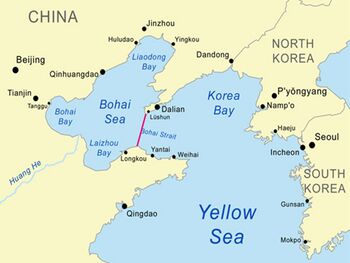مشروع نفق مضيق بوهاي
38°18′N 120°54′E / 38.3°N 120.9°E
نفق مضيق بوهاي أو نفق داليان-يانتاي is a proposed undersea tunnel construction project across the Bohai Strait to connect Dalian on the Liaodong Peninsula with Yantai on the Shandong Peninsula. The official name for the project is Bohai Strait Cross-Sea Corridor (صينية: 渤海海峡跨海通道).[1]
Crossing the Bohai Strait, the tunnel would be 123 kilometers (76 mi) long, of which 90 kilometers (56 mi) would be underwater. This would exceed the combined lengths of the two longest undersea tunnels on Earth, the Seikan Tunnel (23.3 km or 14.5 mi) and the Channel Tunnel (37.9 km or 23.5 mi).[2] The tunnel is planned to run more than 100 kilometers (62 mi) under the Strait.[3]
Operated by China Railway Engineering Corporation, the tunnel would be linked to the Chinese high-speed railway system. Cars would be loaded on railway carriages to make the 40-minute crossing. Currently, the Bohai Train Ferry, inaugurated in 2007, crosses the strait in eight hours.[2]
The project was estimated to cost 200 billion yuan (US$32 billion). In August 2014, it was reported that work is likely to commence during the 13th Five-year plan and construction would take ten years to complete.[4]
As of March 2018, the central government now wants to get construction underway on this bay connection 'as soon as possible'.[5]
Plans were formally submitted to the National Development and Reform Commission (NRDC) for approval in May 2019. The project would include bridges from Penglai linking the Changshan Islands, then a tunnel under the main Bohai Strait, for a total length of 125 km. If construction was started in 2020, the opening date would be in the early 2030s. The estimated budget has risen to 300 billion yuan (US$43 billion).[6]
. . . . . . . . . . . . . . . . . . . . . . . . . . . . . . . . . . . . . . . . . . . . . . . . . . . . . . . . . . . . . . . . . . . . . . . . . . . . . . . . . . . . . . . . . . . . . . . . . . . . . . . . . . . . . . . . . . . . . . . . . . . . . . . . . . . . . . . . . . . . . . . . . . . . . . . . . . . . . . . . . . . . . . . .
انظر أيضاً
- Hong Kong–Zhuhai–Macau Bridge
- Taiwan Strait Tunnel Project
- Qiongzhou Strait tunnel
- نفق سـِيْكان
- Japan–Korea Undersea Tunnel
المراجع
- ^ "NPC deputies propose Cross-Bohai-Strait channel". Chinadaily. March 11, 2013. Retrieved July 15, 2013.
- ^ أ ب Minnie Chan (July 12, 2013). "Plan to build world's longest undersea tunnel from Dalian to Yantai". South China Morning Post. Retrieved July 14, 2013.
- ^ Helga Zepp-LaRouche; Michael O. Billington; Ramtanu Maitra; Dennis Small; Bruce Director; Jason Ross; Paul Gallagher; Hussein Askary; Rachel Douglas; Benjamin Deniston (1 December 2014). The New Silk Road Becomes the World Land-Bridge. Executive Intelligence Review. p. 22. ISBN 978-0-943235-24-0.
*Bohai tunnel The proposed tunnel will run more than 100 km (62.1 mi) under the Bohai Strait, to accommodate a high-speed railway between two Chinese cities, each with a population of about 7 million: Dalian, on the northern end, is a major port in heavily industrial Liaoning Province, while Yantai is a center of industry in Shandong Province.
- ^ "China likely to commence construction of world's biggest undersea rail tunnel in 2016". Ecns.cn. 2014-08-22. Retrieved 2014-08-24.
- ^ "我市全国人大代表返连. 努力创造属于新时代的光辉业绩 _ 新时代 _大连新闻_天健网". Archived from the original on 2018-03-23. Retrieved 2018-03-22.
- ^ "China Mulls Next Super Project: The Longest Undersea Tunnel". Caixin. 2019-05-22. Retrieved 2019-12-08.
